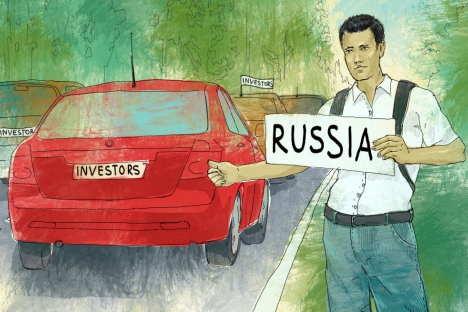Investors pin hopes on Putin’s reform agenda

Drawing by Natalia Mikhailenko
The high levels of capital flight suggest local investors are unconvinced about the prospects for serious structural and economic reform under President Putin, which is widely viewed as essential if Russia is to maintain its current rate of economic growth. And their scepticism is not without foundation. The Russian authorities’ track record of reform has been chequered, with periods of very positive movement (notably 1992 to 1995 and 2000 to 2003) being the exception rather than the norm.
Related:
Steady as she goes will keep business happy
Does Russia’s investment legislature work well?
This time things are different. A new range of external factors have cropped up over the past few years that will galvanise the Kremlin into real and transformative action. Not least of these is that it is unlikely that Russia will be able to rely forever on high oil and gas prices, which to some extent have underpinned its economic performance in the past decade.
Already, there is a great deal of evidence that Putin is this time taking
personal responsibility for the reform agenda, which may indicate that things
are going to change for the better. Putin signed a decree “on the long-term economic policy” on the day of his
inauguration. This decree contains around 30 major reform measures,
including improving and simplifying business regulation and tax-reporting
requirements, selling all state stakes in non-resource companies by 2016,
allowing foreign companies to participate in bids for road infrastructure
projects and removing the threat of criminal sanction from economic legal
disputes.
By strengthening the rule of law and reducing the costs and risks of doing
business, these reforms will go a long way to making Russia more attractive to
investors.
These measures follow other recent developments that suggest Mr Putin is taking
the reform agenda very seriously. Recent
big deals between the Russian oil company Rosneft and its US rival Chevron and
the Norwegian Statoil were personally presided over by Putin, which shows he
is committed to working with foreign partners. This is a symbolic
development for Russia,
given how central its energy-exporting sector is to its overall economy.
Furthermore, recent announcements of investment in Russia by foreign companies
including the car manufacturers Renault-Nissan, also demonstrate that the
government’s attempts to
diversify away from natural resources might finally be starting to pay
off.
On foreign policy, the government has recently announced a new focus on
facilitating visa-free travel between Russia
and Europe, which would help reduce the costs and bureaucracy of doing business
in Russia.
Investors cannot be certain that all of these initiatives will be implemented
and, given the government’s track record, there are reasons to be cautious. But this time, Mr Putin is under real external and
internal pressure to secure his legacy as the president who finally delivered a
modern economy for Russia. The stakes are high, not just for the president but
for the millions of Russians who are looking for a secure economic future.
Alexey Moiseev is head of macroeconomic
analysis at VTB Capital, London.
All rights reserved by Rossiyskaya Gazeta.
Subscribe
to our newsletter!
Get the week's best stories straight to your inbox